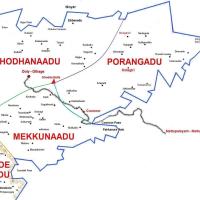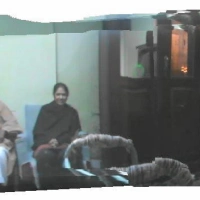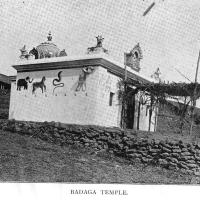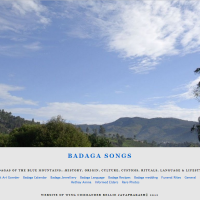1) Koodalu, 2) Aalaani 3) Nallaani 4) Aani 5) Aadire 6) Aadi 7) Aavaani 8) Perattaadhi 9) Dhodda Devige 10) Kiru Devige 11) Thai 12) HemmattiThe more I listen to the song 'Kappu Uttileyu', the more fascinated I become. All the 12 Badaga months starting with Koodalu [given in Capital Letters] are beautifully integrated within the song.
Go here to listen to the songThe lyrics of the song go like this :-
Kappu huttileyu neppuna sundari,
Oppi hegileyu dhirachiya mundari
Kappu huttile naa hathuna notta dha,
Keppu na huttile ondhuna notta tha
Thatti beetha sileyu nee edhega,
Kottu beetha hennu naa edhaga
Muthu muthu mookathiga sokki hodhane, netti niddane
Sothu pathu neetha endhu kaathundhu endhe dha, matha hegu dha, madhuvaya matha hegudha,
KOODALU thinguvana koodile singarene ,
AALAANI thinguvatha aa aagi varasha mamma ,
NALLANI go kollaandhu hega beda, ,
AANI huttidha mele badhila hegine baa mamma ,
AADHIRE jena nodi bae thumbi maathaadu ,
AADI mudidha mele ododi bannane mamma,
AAVANI thinguvadhoge dhaavani singarava ,
Arattu perattu aara PERATTASI thinguvadha,
DODDA DIVIGEYA dodda kiru edhega ,
KIRU DIVIGEYA siri devi aagi banne ,
THAI mae thalaiga thatti kai yoda aatta paatta.
HEMMATTI ebbaneyu aemaathithindhu hoga beda ,
Thatti beetha sileyu nee edhaga ,
Kottu beetha hennu naa edhega
கப்பு ஹுட்டிலெயு நெப்புன சுந்தரி,
ஓப்பி ஹெகிலெயு திரசிய முந்தரி
கப்பு ஹுட்டிலே நா ஹத்துன நோட்ட த,
கெப்பு ந ஹுட்டிலே ஒந்துன நோட்ட த
தட்டி பீத்த செலெயு நீ எதெக,
கொட்டு பீத்த ஹெண்ணு நா எதக
முத்து முத்து மூக்கத்திக சொக்கி ஹொதனே,நெட்டி நித்தனெ
ஸொத்து பத்து நீத்த எந்து காத்துண்டு இந்தெ த, மாத்த ஹேகு த, மதுவய மத்த ஹெகுத,
கூடலு திங்குவன கூடிலே சிங்காரெனெ,
ஆலாணி திங்குவத ஆ ஆகி வரஷ மம்ம,
நல்லானி கொ கொள்ளாந்து ஹேக பேட,
ஆணீ ஹுட்டித மேலே பதில ஹெகினே பா மம்ம,
ஆதிரே ஜென நோடி பே தும்பி மாத்தாடு ,
ஆடி முடித மேலே ஓடோடி பன்னனே மம்ம,
ஆவாணி திங்குவதொகே தாவணி சிங்கரவ,
அரட்டு பெரட்டு ஆர பெரட்டாதி திங்குவத,
தொட்ட தீவிகியொ தொட்ட கிரு எதெக,
கிரு தீவிகியொ சிரி தேவி ஆகி பன்னே,
தை மே தலைக தட்டி கை யோட ஆட்ட பாட்ட.
எம்மாட்டி எப்பனேயு ஏமாத்திதிண்டு ஹோக பேட,
தட்டி பீத்த சிலெயு நீ எதக ,
கொட்டு பீத்த ஹெண்ணு நா எதெக














 Mookuthi
Mookuthi  Chinna
Chinna 






 ==
==












































